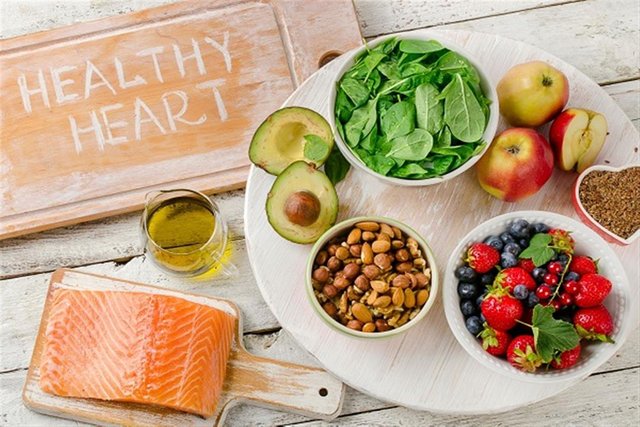
Heart-Healthy Food Guide
A heart-healthy diet consists of a variety of nutritious foods that promote cardiovascular health. Here are some of the best heart-healthy foods you can incorporate into your diet:
Fatty Fish: Rich in omega-3 fatty acids, fatty fish like salmon, mackerel, trout, and sardines can help lower blood pressure and reduce the risk of heart disease.
Leafy Green Vegetables: Vegetables like spinach, kale, collard greens, and Swiss chard are packed with antioxidants, vitamins, and minerals that contribute to heart health. They are also low in calories and high In fiber.
Berries: Blueberries, strawberries, raspberries, and blackberries are all excellent sources of antioxidants, whichh help reduce inflammation and oxidative stress, both of which are linked to heart disease.
Whole Grains: Incorporating whole grains like oats, quinoa, brown rice, whole wheat, and barley into your diet can help lower cholesterol levels and maintain heart health.
Avocado: Avocados are a great source of healthy monounsaturated fats, which can help lower bad cholesterol levels. They are also rich in fiber, vitamins, and minerals.
Nuts and Seeds: Almonds, walnuts, flaxseeds, chia seeds, and hemp seeds are all heart-healthy options. They are rich in omega-3 fatty acids, fiber, and other beneficial nutrients.
Legumes: Beans, lentils, chickpeas, and other legumes are high in fiber, protein, and minerals. They can help lower cholesterol levels and maintain stable blood sugar levels.
Olive Oil: Olive oil is a healthier alternative to saturated fats like butter or margarine. It is rich in monounsaturated fats and antioxidants, which can benefit heart health.
Dark Chocolate: Dark chocolate with a high cocoa content (70% or more) contains flavonoids that have antioxidant and anti-inflammatory properties. It can improve heart health when consumed in moderation.
Green Tea: Green tea Is rich in antioxidants, particularly catechins, which may improve heart health by reducing blood pressure and cholesterol levels.
Remember, maintaining a balanced diet, portion control, and regular exercise are all important components of a heart-healthy lifestyle. It's always a good idea to consult with a healthcare professional or registered dietitian for personalized advice based on your specific health needs.
Here are some additional heart-healthy foods to complete the list:
Citrus Fruits: Oranges, grapefruits, lemons, and limes are packed with vitamin C, fiber, and antioxidants. They can help lower blood pressure and reduce the risk of heart disease.
Tomatoes: Tomatoes are an excellent source of lycopene, an antioxidant that helps reduce inflammation and may lower the risk of heart disease. They are also rich in vitamins and minerals.
Garlic: Garlic contains compounds that can help improve cholesterol levels and reduce blood pressure. Incorporating garlic into your cooking or taking garlic supplements may have heart-protective effects.
Pomegranates: Pomegranates are loaded with antioxidants and phytochemicals that promote heart health. They may help lower blood pressure and reduce inflammation.
Yogurt: Opt for low-fat or Greek yogurt, which is high in protein and calcium. It can be a nutritious option to support heart health when consumed in moderation.
Red Wine (in moderation): Red wine, when consumed in moderation, has been associated with heart benefits due to its antioxidant content and potential to increase HDL (good) cholesterol levels. It's important to limit alcohol intake and consult with a healthcare professional if you have specific health conditions.
Turmeric: Turmeric contains curcumin, a compound known for its anti-inflammatory properties. Adding turmeric to your dishes or consuming it as a supplement may have heart-protective effects.
Broccoli: Broccoli is a cruciferous vegetable packed with antioxidants, fiber, and a variety of vitamins and minerals. It may help reduce the risk of heart disease by improving cholesterol levels.
Flaxseeds: Flaxseeds are a great source of omega-3 fatty acids, fiber, and lignans, whichh have been shown to have heart-healthy benefits. Ground flaxseeds can be added to smoothies, cereals, or baked goods.
Walnuts: Walnuts are rich in omega-3 fatty acids, fiber, and antioxidants. They have been associated with improved cholesterol levels and reduced inflammation, making them a heart-healthy snack.
Remember to incorporate these foods into a balanced diet and make overall lifestyle changes that promote heart health. Regular physical activity, maintaining a healthy weight, managing stress levels, and avoiding smoking are all essential for a healthy heart